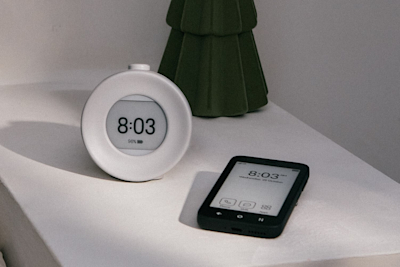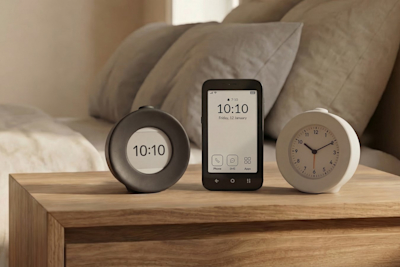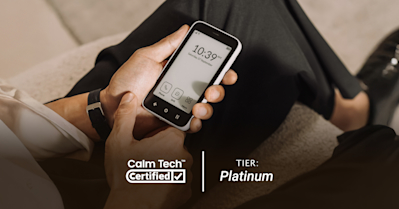
Is it safe to give your child a smartphone?
Screen Time Showdown
As technology advances & becomes more prevalent in our everyday lives, there will come a day in the life of a parent when they have to face the challenge of deciding when it’s appropriate for their children to have access to smartphones, or any other digital devices for that matter.
For a parent, even deciding whether or not to even give their child a smartphone (as opposed to when would be the right time) can be a complex and challenging decision. Children these days are becoming very adept at playing games on their parents' digital devices at an extremely early age, making the question of when to provide them with their own phone more pressing than ever.
Recent research from 2021 reveals that more than two-fifths (42%) of children already have their own phone by the time they are 10 years old. This figure jumps to 71% by age 12 and a staggering 91% by age 14.
As a parent, It's important to approach this decision thoughtfully and with mindfulness towards your child's needs and safety.
While smartphones can provide children with access to information and entertainment, they also come with risks and dangers. The question, which can spark considerable debate, then arises: is it safe to give a young child a smartphone? If the answer is yes, then at what age should a child have access to their own smartphone.
There is no easy answer to this question, as different parents and experts have varying opinions on the matter. Some argue that giving a young child a smartphone can be beneficial, while others warn against the potential risks and negative effects on their development.
Let's explore both sides of the argument, so that we can have a better understanding of the risks and benefits, and perhaps come to a reasonable conclusion. Let's get into it.
The Breakdown
On the one hand, some experts argue that smartphones can be somewhat beneficial for young children. With the ability to access educational apps and games, children can learn and develop new skills. They can also use smartphones to stay in touch with friends and family, which can be particularly important in the current digital age. Additionally, smartphones can provide a sense of security for children who may need to contact their parents or emergency services in case of an emergency.
One of the most significant reasons why parents may choose to give their child a smartphone is for safety purposes. In an emergency, a child can use their phone to call for help or contact their parents. Additionally, with the use of location tracking technology, parents can monitor their child's whereabouts and ensure that they are safe.
Another potential benefit of giving a young child a smartphone is for educational purposes. Many educational apps and games are available which can help children learn new skills and concepts, such as reading, math, or language skills. Additionally, smartphones can provide access to online resources that can supplement a child's education, or allow the child to attend school remotely, if the need arises.
Keeping in touch with friends and loved ones, especially those living in different towns, states or countries can help children stay connected and nurture meaningful relationships. This is particularly crucial during these times of heightened loneliness.
However, there are also concerns about the negative effects of smartphones on young children. One of the most significant concerns is the impact on their mental and emotional health. Research has shown that excessive screen time can lead to sleep problems, anxiety, and depression. Children may also become addicted to their devices, which can lead to social isolation and a lack of physical activity.
A recent study has shed light on the impact of screen media activity in over 5,100 9- and 10-year-olds, who participated in the Adolescent Brain Cognitive Development (ABCD) Study, the largest long-term analysis of brain development and child health in the United States. The study was led by the faculty at the Yale Department of Psychiatry and Columbia School of Nursing.
The results of the study, published in the Journal of Behavioral Addictions, are concerning. It revealed that children who spent large amounts of time interacting with digital technology were more likely to experience internalizing problems, such as anxiety, depression, somatic complaints, social anxiety, and other similar issues. These mental health problems were related to particular changes in brain development, according to the research.
It’s worth noting that the scientists had previously observed similar patterns of brain development in adults who consumed alcohol when they were younger, as well as ABCD youth who spent the most time interacting with digital technology. However, the present study did not find that the same brain changes mediated relationships between frequent screen time and externalizing problems two years later. Externalizing problems include physical aggression, verbal bullying, relational aggression, defiance, and other concerns.
If the well-being of children is to be considered a priority, it’s important to consider the implications of this study and encourage mindful interactions with digital technology for children. This study serves an important purpose in helping us better understand the impact of technology use on the well-being of children.
Another major concern is the potential exposure to inappropriate content, such as violence or explicit material, which can have lasting negative effects on children. Cyberbullying is also a significant issue, as children may be more vulnerable to online harassment and peer pressure.
Finally, there is the risk of online predators, who may use smartphones to harm and exploit children.
Considering the potential risks and benefits, it is clear that very young children should not have access to smartphones. Instead, parents can consider providing their children with classic feature phones which allow for phone calls and basic text messaging, like the Mudita Pure. This way, parents can stay in touch with their children without exposing them to the negative effects of excessive screen time and potential risks associated with smartphones.
As children become older and more responsible, parents can approach the decision of whether or not to give them a phone with more advanced features, such as internet access and social media apps. It's important for parents to have open and honest conversations with their children about the responsible use of smartphones and the potential risks involved, such as cyberbullying, exposure to inappropriate content, and addiction to social media.
Setting clear guidelines and boundaries around screen time can also help to mitigate these risks and ensure that children are using technology in a healthy and productive way. Ultimately, the decision to give a child a smartphone should be based on their individual maturity level and ability to use technology responsibly.
Final Thoughts
The decision to give a young child a smartphone is a complex one, with no one-size-fits-all answer. While smartphones can provide benefits, such as educational opportunities and a sense of security, they also come with significant risks and negative effects on mental and emotional health.
Therefore, parents should carefully consider their child's needs and risks before deciding whether to provide them with a smartphone.
At the same time, by gathering data on both the positive and negative outcomes of technology use, experts can work towards developing more informed and effective guidelines for promoting healthy usage. In doing so, parents can take a more mindful approach to technology use so that it prioritizes the overall health and well-being of their children.
In most cases, classic feature phones, or flip phones are a safer alternative which can provide the necessary communication without the potential dangers associated with smartphones.
Finally, it is important to remember that mindful technology use can have a positive impact on our health and well-being, so we should strive to balance the benefits and risks of technology in our daily lives.
If you’d like to read more about topics connected to sleep, please check out some of our other articles published on our blog:
Related stories

How To Build a More Thoughtful Relationship with Tech in 2026
Build a more thoughtful relationship with technology in 2026. Learn how mindful tech use & mindful devices can help you reclaim focus, rest, and balance.

Reclaiming the Year Ahead, One Intentional Choice at a Time
Reclaim your year through small, intentional choices. Learn how digital decluttering and mindful technology can restore focus, calm, and clarity.

Mudita Kompakt is Platinum Tier Calm Tech Certified™
Mudita Kompakt is Calm Tech Certified.™ Technology should serve your attention, not compete for it. Mudita Kompakt proves it’s possible.
If you'd like to receive the best stories from our blog, keep up to date with our progress and get notified about our product releases and special discounts.